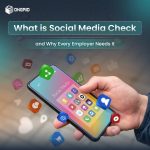Table of Contents
Toggle
Trust and security are paramount in this digital age, whether in corporate hiring, tenant screening, or issuing government clearances. One of the most effective tools for establishing trust is the Criminal Record Check. This verification process helps organizations and individuals make informed decisions by identifying any past criminal history of an applicant.
Must read: Safeguarding Against Banking Frauds with Criminal Court Record Verification
Understanding Criminal Record Check
Criminal Record Checks are used to verify whether an individual has any criminal background. It involves searching national or international databases, police records, and court documents to determine if a person has been convicted of crimes or has pending legal cases. This check is commonly conducted by employers, landlords, financial institutions, and government agencies to assess the risk associated with a particular individual.
Why is Criminal Record Verification Important?
The significance of a Criminal Record Check cannot be overstated. It serves multiple purposes, including the following:
Workplace Safety and Security: Employers must ensure a safe work environment for their employees and customers. Verifying a candidate’s criminal history can prevent hiring individuals with a record of violent or fraudulent activities.
Protecting Business Interests: Organizations, especially those handling sensitive information or financial transactions, need employees with integrity. A Criminal Record Check helps mitigate the risks of fraud, theft, and corporate espionage.
Regulatory and Compliance Requirements: Many industries, such as healthcare, finance, and education, have strict regulations mandating background verification, including criminal checks, before employment.
Safeguarding Residential Communities: Landlords and property managers often conduct background checks on potential tenants to ensure a safe and secure living environment for all residents.
Government and Security Clearances: Government agencies require criminal verification before issuing visas, security clearances, or professional licenses to individuals.
Different Types of Criminal Record Checks

1. Court Record Verification
This involves searching digitized court records to identify any criminal or civil cases associated with an individual. It is widely used by businesses and landlords to verify the legal standing of applicants.
2. Police Clearance Certificate (PCC)
A PCC is an official document issued by law enforcement agencies certifying that an individual has no criminal history within a specified jurisdiction. It is often required for immigration, employment, or travel purposes.
3. Global Database Checks
This check involves screening international databases to identify any involvement in fraudulent activities, terrorism, sanctions lists, or other regulatory violations. It is particularly useful for multinational corporations and financial institutions.
4. eFIR Check
An e-FIR check is a digital screening process that identifies any registered First Information Reports (FIRs) against an individual. Unlike traditional background checks, which rely on slow court processes, e-FIR checks provide real-time insights into complaints filed with law enforcement.
The Process of Conducting a Criminal Record Check
The Criminal Record Check process varies depending on the country and organization conducting it. However, the general steps involved are:
Consent and Documentation: The individual undergoing verification provides written consent and necessary identification documents.
Database Search: National and international records, court documents, and police records are scanned for any matches.
Verification with Authorities: In some cases, direct verification with police departments or legal agencies is conducted.
Report Generation: The findings are compiled into a report, categorizing the results as ‘clear’ (no records found) or ‘flagged’ (records found with details).
Decision-Making: Based on the report, employers, landlords, or agencies decide whether to proceed with the individual’s application.
Best Practices for Conducting a Reliable Criminal Record Check
To ensure an accurate and legally compliant Criminal Record Check, organizations should:
Use authorized background verification agencies with a track record of compliance and reliability.
Obtain explicit consent from the individual before conducting the check.
Regularly update verification protocols to comply with legal and technological advancements.
Cross-verify information using multiple sources to ensure accuracy.
Maintain transparency by allowing individuals to dispute any incorrect information found in their records.
The Future of Criminal Verification
With advancements in technology, the Criminal Record Check process is becoming faster and more efficient. AI-driven background verification tools, blockchain-based record-keeping, and digital ID verification are revolutionizing how organizations conduct background screening. As legal frameworks evolve, the focus will increasingly be on balancing security with individual privacy rights.
Conclusion
A Criminal Record Check is an essential tool for fostering trust and security in various sectors. From employment and housing to finance and governance, criminal verification helps ensure that individuals and organizations make informed, risk-free decisions. While challenges remain, technological advancements and regulatory compliance efforts continue to improve the effectiveness and reliability of this process. As the world moves toward greater digitalization and security consciousness, the role of Criminal Record Check in shaping a safer society will only grow stronger.
FAQ’S
Q1. What is a criminal record check, and why might I need one?
A criminal record check is a process used to verify whether someone has a criminal history. You might need one for employment, renting a property, applying for a visa, or even for volunteering in certain sectors.
Q2. Who can request a criminal record check on me?
Employers, landlords, government agencies, and sometimes financial institutions can request a criminal record check—with your consent—depending on the purpose and local regulations.
Q3. What kind of information shows up on a criminal record check?
It can include arrests, charges, convictions, court rulings, pending cases, and sometimes complaints like FIRs, depending on the type and depth of the check being conducted.
Q4. What is a Police Clearance Certificate (PCC), and when do I need it?
A PCC is an official certificate confirming that you have no criminal record in a specific jurisdiction. It’s often needed for immigration, work abroad, or international travel.





Leave a Reply